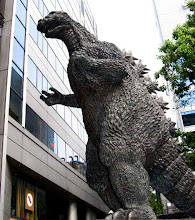


Gary Larson was born and raised in University Place, Washington. His parents are Vernon, a car salesman, and Doris, a secretary. He attended Curtis Senior High School before attending Washington State University, from which he graduated in 1972 with a degree in communications. In 1987, Larson married Toni Carmichael, an anthropologist. Ms. Carmichael graduated from Safford High School in 1972, before pursuing a higher education.
Larson credits his older brother Dan for his "paranoid" sense of humor. Dan would pull countless pranks on Gary, taking advantage of his phobia of monsters under the bed by, for example, waiting in the closet for the right moment to pounce out at Gary. Dan is also credited with giving Gary his love of science. They caught animals in Puget Sound and placed them in terrariums in the basement, even making a small desert ecosystem. His use of snakes in his cartoons stems from his long-standing interest in herpetology. Dan died of cancer in 1991.








